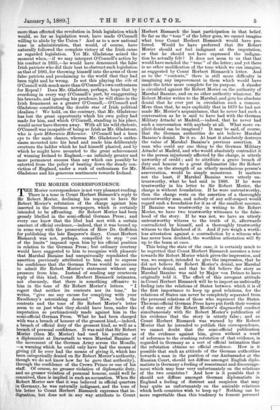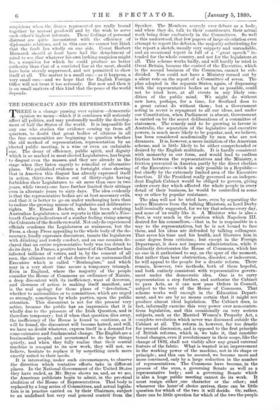THE MORTRR CORRESPONDENCE.
TH-PMorier correspondence is not very pleasant reading. here is a tone in Count Herbert Bismarck's reply to Sir Robert Morier, declining his request to have Sir Robert Morier's refutation of the charge against him inserted in the German newspapers, which is certainly intended to be affronting. Sir Robert Morier had been grossly libelled in the semi-official German Press ; and every one knew that the libel had met with a certain amount of official credence,—indeed, that it was bound up in some way with the prosecution of Herr Dr. GI-effcken for publishing the late Emperor's diary. Count Herbert Bismarck was not, perhaps, compelled to step "out of the limits" imposed upon him by his official position in relation to the German Press ; but ordinary courtesy would have suggested to him to recognise with pleasure that Marshal Bazaine had unequivocally repudiated the assertion previously attributed to him, and to express his confidence that the German Press would be anxious to admit Sir Robert Morier's statement without any pressure from him. Instead of sending any courteous reply of this kind, Count Herbert Bismarck intimates, not obscurely, that there is something offensive to him in the tone of Sir Robert Morier's letters. "I regret that neither its contents nor its tone," he writes, "give me any excuse for complying with your Excellency's astonishing demand." Now, both the contents and the tone of Sir Robert Morier's letter seem to us just what they should have been, under the imputation so pertinaciously made against him in the semi-official German Press. What he had been charged with was a breach of honour of the grossest kind,—indeed, a breach of official duty of the grossest kind, as well as a breach of personal confidence. It was said that Sir Robert Morier (then Mr. Morier) had used his position as a diplomatist at Darmstadt to warn Marshal Bazaine of the movement of the German Array across the Moselle, —a warning which he could only have had the means of giving (if he ever had the means of giving it, which has been categorically denied on Sir Robert Morier's authority, though we do not know how far he gave that authority), through the confidence of the Crown Prince or one of his staff. Of course, no grosser violation of diplomatic duty, and no grosser violation of personal honour, could well be conceived, than is implied in such an accusation. When Sir Robert limier saw that it was believed in official quarters in Germany, he was naturally indignant, and the tone of his letter to Count Herbert Bismarck expresses that in- dignation, but does not in any way attribute to Count Herbert Bismarck the least participation in that belief. So far as the " tone " of the letter goes, we cannot imagine what tone Count Herbert Bismarck would have pre- ferred. Would he have preferred that Sir Robert Morier should not feel indignant at the imputation, or that he should not have expressed the indigna- tion he actually felt ? It does not seem to us that that would have mended the " tone " of the letter; and yet there is no other modification of the tone which we can imagine, as suggested by Count Herbert Bismarck's letter. And as to the "contents," there is still more difficulty in imagining any improvement in them which would have made the letter more complete for its purpose. A slander is circulated against Sir Robert Morier on the authority of Marshal Bazaine, and on no other authority whatever. Sir Robert Morier writes to the Marshal, and gets his absolute denial that he ever put in circulation such a rumour. More than that, he says explicitly that in 1870 he had not made Mr. Morier's acquaintance, that he never had such a conversation as he is said to have had with the German Military Attache at Madrid,—indeed, that he never had such a conversation with anybody at all. What more ex- plicit denial can be imagined ? It may be said, of course, that the German authorities do not believe Marshal Bazaine's denial. Be it so. At least it absolutely destroys the value of Marshal Bazaine's previous assertion. A man who could say one thi a to the German Military Attache at Madrid, and who would absolutely contradict it to the person injuriously affected by the charge, is utterly unworthy of credit ; and to attribute a grave breach of duty and honour to a great diplomatist like Sir Robert Morier, on the strength of an utterly mendacious person's asseveration, would be simply monstrous. It matters not the least, if Marshal Bazaine were utterly un- trustworthy, what he had said in 1886. If he were trustworthy in his letter to Sir Robert Morier, the charge is without foundation. If he were untrustworthy, then the charge rests on the assertion of a thoroughly untrustworthy man, and nobody of any self-respect would regard such a foundation for it as of the smallest account.
If Bazaine was trustworthy in writing to Sir Robert Morier, we have two trustworthy witnesses to the false- hood of the story. If he was not, we have an utterly untrustworthy witness to the truth of it, afterwards contradicted by himself, and a thoroughly trustworthy witness to the falsehood of it. And if you weigh a worth- less attestation against a contradiction by a witness who has never been doubted, the worthless attestation will fly up to the beam at once.
This being the state of the case, it is certainly much to be regretted that Count Herbert Bismarck assumes a tone towards Sir Robert Morier which gives the impression, and was, we suspect, intended to give the impression, that he did not believe Sir Robert Morier's denial, nor Marshal Bazaine's denial, and that he did. believe the story as Marshal Bazaine was said by Major von Deines to have originally told it. The effect of this arrogant attitude in Count Herbert Bismarck will be to import an unfriendly feeling into the relations of States between which it is of the first importance to keep up good relations, for the relations of States can never be completely separated from the personal relations of those who represent the States. The semi-official German Press have put forth their version of the story of Sir Robert Morier's disgraceful conduct simultaneously with Sir Robert Morier's publication of his evidence that the story is utterly false ; and as Count Herbert Bismarck was warned by Sir Robert Morier that he intended to publish this correspondence, we cannot doubt that the semi-official publication of the evidence against him, given without a word of reference to the crushing refutation of that evidence, is regarded in Germany as a sort of official intimation that the refutation obtains no official credence. How is it possible that such an attitude of the German authorities towards a man in the position of our Ambassador at the Russian Court, should not diffuse amongst English diplo- matists in Germany a feeling of resentment and discourage- ment which May bear very unfortunately on the relations of the two countries ? And how is it possible that it should not diffuse amongst German diplomatists in England a feeling of distrust and suspicion that may bear quite as unfortunately on the amicable relations which both countries wish to keep up ? Nothing can be more regrettable than this tendency to foment personal suspicions when the States represented are really bound together by mutual good-will and by the wish to serve each other's highest interests. These feelings of personal distrust are quite inconsistent with the efficiency of diplomatic relations, and in this case we cannot but think that the fault lies wholly on one side. Count Herbert Bismarck should at least have had the detachment of mind to see, that whatever his own lurking suspicion might be, a suspicion for which he could produce no better authority than that of a convicted liar at the most, should have been sternly suppressed, and not permitted to show itself at all. The matter is a small one,—as it happens, a very small one,—and we hope that the English Foreign Office will not treat it too seriously. But now and then it is on small matters of this kind that the peace of the world depends.















































 Previous page
Previous page